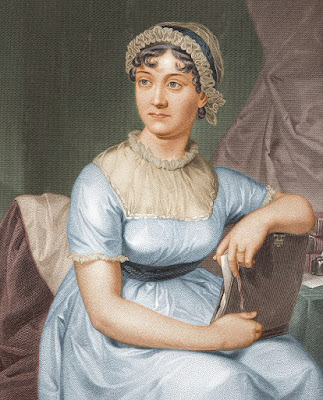“Mansfield Park”: How the 1999 Film Got Austen Right (More or Less)
Following is part one of my end-of-term essay for my core course in Eighteenth-Century Studies at King's College London, Autumn 2017
In the wake of the sexual assault cases that have rattled Hollywood and beyond, seeing a film co-executive produced by Harvey Weinstein is problematic: On the one hand, knowing someone like he had his hand in the mix cannot help but color the viewing. When Sir Thomas says to Fanny in a less-than-platonic way, “You’ve grown in health and, I dare say, beauty,” though it’s almost verbatim what’s in the text, knowing what one knows about Weinstein makes it a difficult moment.
Even so, films should be judged on individual merit, like paintings or books, and it would be impossible to remove every bad actor from the annals of artistic history.
In the 1999 Miramax film “Mansfield Park”, adapted from the Jane Austen 1814 classic and from her letters and early journals, lovers of the long eighteenth-century are in for a treat. Not only does the film perfectly showcase the gardens, costumes, manners, and amusements of the period, but much of Austen’s dialogue is left intact.
For example, toward the beginning of the film, after it is agreed that the child Fanny, niece of Sir Thomas and Lady Bertram, is to come live with them, the patriarch warns his kin: “Maria, Julia, listen … We must prepare ourselves for gross ignorance, some meanness of opinion, and a certain vulgarity of manners.” This is almost word for word what Austen wrote:
"Should her disposition be really bad,” said Sir Thomas, “we must not, for our own children’s sake, continue her in the family; but there is no reason to expect so great an evil. We shall probably see much to wish altered in her, and must prepare ourselves for gross ignorance, some meanness of opinions, and very distressing vulgarity of manner; but these are not incurable faults — nor, I trust, can they be dangerous for her associates…"
Many other examples of dialogue fidelity appear, notably when Miss Crawford, who has been chosen to star in an ad hoc production of Lovers’ Vows at the Betram house, turns to ask: “I wish to play Amelia. But which gentleman am to have the pleasure of making love to?” In the book Austen writes: “Who is to be Anhalt? What gentleman among you, am I to have the pleasure of making love to?”
The film also mimics the book in many other ways, including accurately portraying the dynamic between Edmund, Fanny, and Mary Crawford. The spot on way actress Embeth Davidtz provides her character with just the right degree of cunning and feigned kindness – like a snake dressed in a royal robe – would have made Austen very proud. The cinematic version of the story also nicely injects the warmth of the relationship between first cousins Fanny and Edmund, not only as they grow as adult friends and then paramours, but as children. The scene where he comes to comfort her as she cries about missing her family and no doubt, sensing the coldness with which she will be treated at the home, is not only touching, but faithful to Austen, who writes:
"My dear little cousin,” said he with all the gentleness of an excellent nature, “what can be the matter?” And sitting down by her, was at great pains to overcome her shame in being so surprised and persuade her to speak openly…He tried to console her.
And then Austen writes of this compassionate exchange, that the result was:
From this day Fanny grew more comfortable. She felt that she had a friend, and the kindness of her cousin Edmund gave her better spirits with every body else.
Yet, the film also takes much artistic license, notably: Fanny’s primary sibling relationship in the novel is not with a sister, but with an older brother named William whom she misses terribly until he appears at the Bertrams’, et al.; and the book doesn’t present the family business as slavery even though it hints that Sir Thomas could be involved in such things while in the West Indies. The carriage driver picking up Fanny at the film’s beginning says the ship coming in is likely filled with “a few darkies good for the wife.”
This begs the point, has adaptation theory really come into its own? Another question to ask would be whether those adapting a novel, the Miramax filmmakers in this case, owe it to the author to remain faithful? Writer Mireia Aragay discussed this point when she wrote that “the history of adaptation is as long as the history of cinema itself.” She added that,
More crudely, Virginia Woolf’s 1926 rhetoric of cinema as a rapacious animal of prey or parasite devouring ‘its unfortunate victim’, literature (Woolf 1966: 269-70), was equally pervasive within the discourse of adaptation until relatively recent times.
No film based on a novel remains entirely faithful to it, because filmmakers want to put their own creative stamp on their works. The same idea holds true for those summer-in-the-park Shakespearians who choose to use an all African American cast to perform Hamlet or create a musical based on King Lear.
In “Mansfield Park” the film, though, the departures from Austen’s text are when it feels disingenuous. For example, in the film passages where Edmund is discussing Sir Thomas’ illicit pursuits, he says to Fanny: “We all live off the profits, including you.” Such a line never appears in the novel. It is also later very jarring to see images of tortured slaves, almost sexualized, and see Sir Thomas scream at Fanny for finding and looking at them. In the book, there is some suggestion of the family’s involvement in the slave trade, and one line in particular has given scholars something to ponder in this regard, but by no means is slavery a strong theme in the book.
Yet, scholars are curious about the slavery question; while it’s rendered much more delicately in the book, it does not mean it’s less potent. Often an undercurrent has a stronger effect than an actual tide. To wit, this passage, when Edmund says to Fanny, gives one pause:
Your uncle is disposed to be pleased with you in every respect; and I only wish you would talk to him more. —You are one of those who are too silent in the evening circle.
Fanny’s answer is provocative and puzzling:
“But I do talk to him more than I used. I am sure I do. Did not you hear me ask him about the slave trade last night?”
A blogger and teacher, “Fedoralady”, concurs:
The whole production takes considerable liberalities, including the addition of social commentary concerning slavery in Antigua, where the Bertrams have holdings…
Another glaring difference is how the sister Susan is depicted, showing up as a kind of afterthought to her sister Fanny, who only grows more attached to her through her stay at her original home. By no means, though, is Fanny as excited about Susan in the book as she is in the film, whereby she’s a giggling schoolgirl beneath the covers with her cherished sister.
Besides lapses in fidelity, though, the film “Mansfield Park” got the basic premise of the novel correct – Fanny does show up at her uncle and aunts’ doorstep, being sent off by her poor, overburdened parents on the coast, and she does struggle at first to get on with the uptight Bertrams. She is belittled by Aunt Norris, overly sized up by her uncle, Sir Thomas, and mocked for doing what comes naturally, such as lying down on the sofa after becoming flushed out by the rose garden. After all, when one has brought her poor relation into the home, the thought is she’s being done such a favor that her every waking moment should be devoted to staying productive. Or such was Aunt Norris’ thought.
One area where the film is very true to the novel is the relationship between Edmund and Fanny. It nicely mirrors how he comes to realize Mary Crawford’s layers of neurotic selfishness and suddenly sees Fanny anew. In real life, which this story clearly isn’t, it is a little hard to make that quick of a mental jump but this is high romance. Austen fanatics love this sort of thing.
Backing up the visual splendor including sweeping cinematography of the English countryside, is a stunning score by Leslie Barber, “Theme From Mansfield Park.” It beautifully evokes the period in which the story is set. and of which one writer said:
Very pleasant and very effective writing, using a limited orchestral palette; meant to evoke the period, ca early 1800’s, which it does being new music and relying on configuration a hint of harmonic period practice and as much on suggestion without ever falling directly into pastiche …
The costumes in Mansfield are pleasing and faithful to the period, too, as well as faithful to the period, i.e. the corset Fanny is putting on in one scene with Mary; as is the décor, the expansive home, and the horses. The film also presents the two Bertram sisters playing a glass harmonica, a faithful homage to the eighteenth-century and Austen. The glass harmonica was invented by Ben Franklin in that period:
He had heard Edward Delaval, a Fellow of the Royal Society, play on his set of musical glasses in 1759 … Edward Delaval was fascinated by the properties of glass and he studied the specific gravities of several metals and their colors when bonded with glass, and also how to use it in the manufacture of artificial gems, hence his interest in this instrument. Benjamin Franklin improved upon his idea of the rows of glasses fitted in a cabinet, by creating a very different instrument.
The film also features many other eighteenth-century leisure activities such as Mary Crawford’s harp (also in the novel); cards, popular among the upper class, in the great room; as well as acting and theater and billiards. Certainly, horsemanship is chief among them, with Fanny one of the prime participants in riding, perhaps especially in the film. The horse seems to be a form of emotional release for her, as she struggles with knowing she’s not from the class with whom she mixes, but with whom she feels an intellectual and spiritual equal.
Further, this cinematic 1999 Austen shows other eighteenth-century touches, from the book Fanny is reading in one scene, Lawrence Stern’s “A Sentimental Journey” to what looks to be an oversized dictionary along the lines of a Samuel Johnson, popular in that period.
While the premise of the film is no more difficult than that of the novel to support in modern times – who would marry a first cousin, let alone celebrate such a marriage? – it sometimes feels far more sensational than does the book. When reading Austen, one doesn’t necessarily envision Sir Thomas’s wife as being quite so obtuse as she is in the film, or Fanny’s childhood home quite as severe. Then there’s Henry Crawford in bed with Maria – this kind of behavior is only hinted at in the book as a cause for scandal. It’s hard not to imagine that despite a talented female director, Patricia Rozema, Weinstein had a powerful influence in creating a more sexualized, modern-day Austen tale.
-----------------
Mansfield Park Bibliography
Print Sources:
Austen, Jane, Mansfield Park (184; repr., London: Penguin Group, Penguin Classics, 1996)
Mansfield Park (Patricia Rozema, 1999)
Web Sources:
Austenonly, [accessed 9 January 2018]
“Talk Classical”,[accessed 9 January 2018]
Agnoy, Mireia, Books in Motion: Adaptation, Intertextuality, and Authorship, Introduction, [accessed 9 January 2018]
IMAGE: Wikimedia Commons Images Jane Austen, 1873
University of Texas
Copyright: Laurie Wiegler, January 2018. All rights reserved. No portion of this essay can be reproduced without the express permission of the author: lauriewiegler@lauriewiegler.co.uk.



Comments
Post a Comment